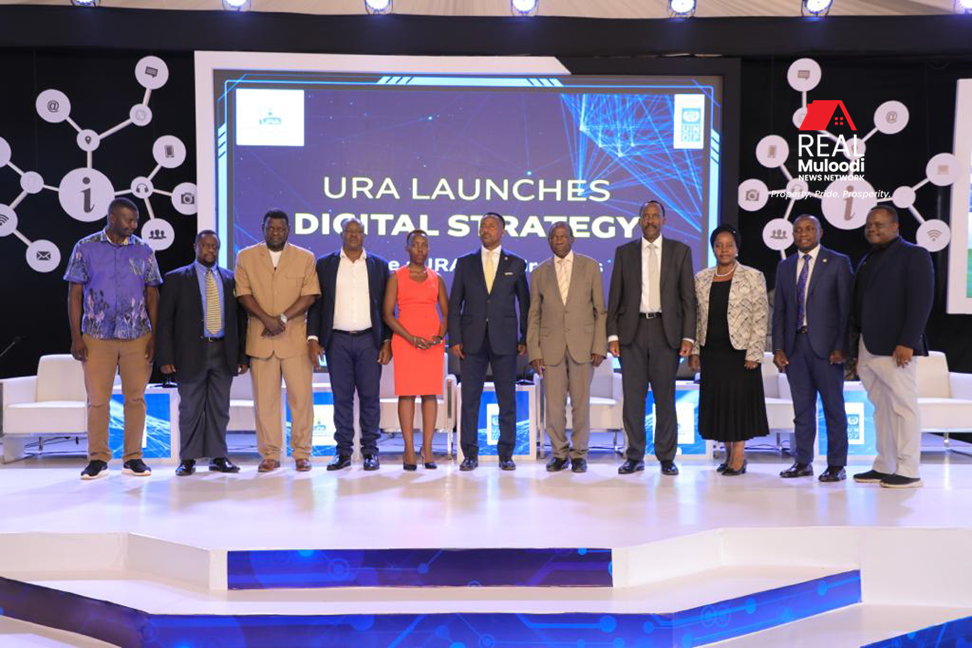UGANDA, Nakawa | Real Muloodi News | The Uganda Revenue Authority (URA) is set to embark on a transformative journey into the digital landscape, poised to reshape tax administration in the country.
The tax authority is launching a five-year digital transformation strategy, marking a significant step towards integrating technology into its operations.
In a move that is expected to streamline tax processes, enhance the quality of services, and combat revenue leakages, URA is venturing into the world of digital transformation.
This strategy is geared towards achieving more efficient and technology-driven tax administration while aligning itself with the government’s digitalisation agenda.
Over the past three years, URA has steadily introduced information and communication technology (ICT) into its tax administration systems, revolutionising both internal processes and external interactions with stakeholders.
The upcoming digital strategy will continue this trajectory and focus on increasing efficiency, utilising ICT to strengthen operations, and bolstering URA’s ability to prevent revenue leakages.
For the last five years, URA has been on a journey of implementing various digital solutions under its Domestic Revenue Mobilisation Strategy.
The goal has been to expand the tax base and encourage more taxpayers to comply with tax regulations. These innovations have included the introduction of Digital Tax Stamps (DTS), the Electronic Fiscal Receipting and Invoicing System (EFRIS), and digitising rental tax through the Compliance System (rTCS), among others.
These digital advancements have played a pivotal role in reducing tax evasion and enhancing compliance.
In a remarkable achievement, the implementation of DTS in 2019 saw excisable tax collections surge by UGX 157.9 billion during the 2022/23 financial year, marking a remarkable 24.2% increase.
The tax authority has collaborated with the United Nations Development Programme on a three-year digital strategy to further integrate technology into tax administration.
This strategic approach prioritises automation, quality assurance, and mitigating revenue leakages, with a paramount focus on delivering a client-centric experience for taxpayers.
The ultimate aim is to simplify tax registration, ensure timely filing, facilitate accurate reporting, and enhance the ease of payment.
During the strategy’s launch in Nakawa, the Hon. Matia Kasaija, the Minister of Finance, Planning, and Economic Development, expressed his unwavering support for URA’s digital transformation journey.
He challenged the URA team to elevate the country’s tax-to-GDP ratio to 20% within the next 2-3 years, despite the current 14% ratio.
He emphasised the significance of generating sufficient revenue to reduce reliance on external borrowing and to create jobs for the country’s youth, support industries, and build essential infrastructure, such as schools and hospitals.
His plea underlines the vital role URA plays in Uganda’s development.
A Vision of Efficiency and Transparency
John R. Musinguzi, the Commissioner General of URA, committed to continue adding value to the organisation’s mission of transparent and efficient revenue mobilisation.
He pointed out that technology is the future of effective revenue management, as it enhances transparency and minimises conflicts associated with tax compliance.
Musinguzi outlined five key areas where URA aims to boost revenue generation. These areas include digitalising URA’s processes, ensuring that URA staff exhibit integrity and professionalism, engaging stakeholders and promoting tax awareness, and investing in innovation and research to enhance data quality.
He shared the journey of URA’s IT transformation, which began in 2009 with the acquisition of systems like Etax for domestic taxes and Asycuda for international trade customs. This year, the tax authority is entering a new phase focused on simplifying taxation and using big data analytics through a fully-fledged data centre.
International Support and Recognition
Sheila Ngatia, the Deputy Resident Representative of the United Nations Development Programme, commended URA for its digital strategy, which aligns with the government’s broader digital agenda.
The focus on increasing efficiency and leveraging ICT to enhance operations and minimise revenue leakages is an important step in the right direction.
Ngatia encouraged URA to invest in robust cybersecurity and empower all Ugandans to reap the benefits of a digitalised economy.
A Look at Digital Solutions
URA has been proactive in rolling out solutions that facilitate taxpayer compliance and interaction with the authority. These solutions include:
1. Electronic Receipting and Invoicing System (EFRIS) for electronic filing and invoicing.
2. Digital Tax Stamping (DTS) for manufacturers to improve tax collection.
3. Customer Relationship Management tools to enhance stakeholder engagement.
4. Non-intrusive inspection with scanners at customs borders.
5. Bond Warehouse management system.
6. Rental Tax Income Management solutions.
7. A Call centre offering multiple touchpoints, including WhatsApp, web, and email.
8. Several taxpayer interface enhancements, including a web portal, a mobile app, and a new USSD menu.
The remarkable growth in excisable tax collections highlights the effectiveness of these digital solutions in improving tax administration and increasing domestic revenue mobilisation.
A report by the World Health Organisation acknowledges the role of digital tax stamps in addressing revenue leakages and enabling traceability of the origin of goods.
Digital tax stamps provide essential information such as brand details, manufacturer’s information, production location, and chronological data, enhancing product traceability and countering tax evasion.
The surge in adoption of DTS, which has seen the number of participating companies rise from 200 in 2020 to 1,171, is a testament to the impact and success of URA’s digital initiatives.
READ MORE LIKE THIS:
URA Issues Rental Tax Ultimatum: Appreciates Landlords and Offers Second Chance
URA Explains Rental Income Tax: Regulations, Compliance, and Collections
URA Extends Olive Branch: Waives Interest and Penalties for Landlords



